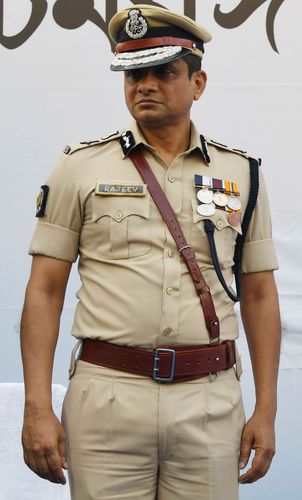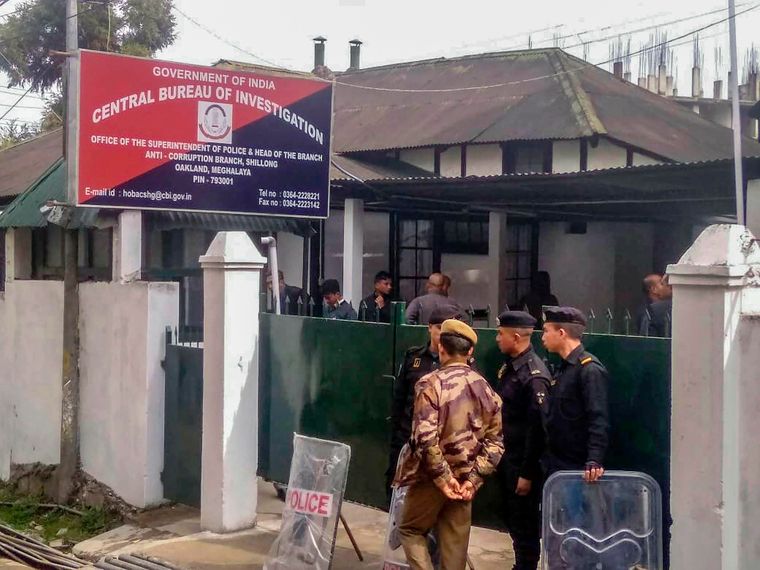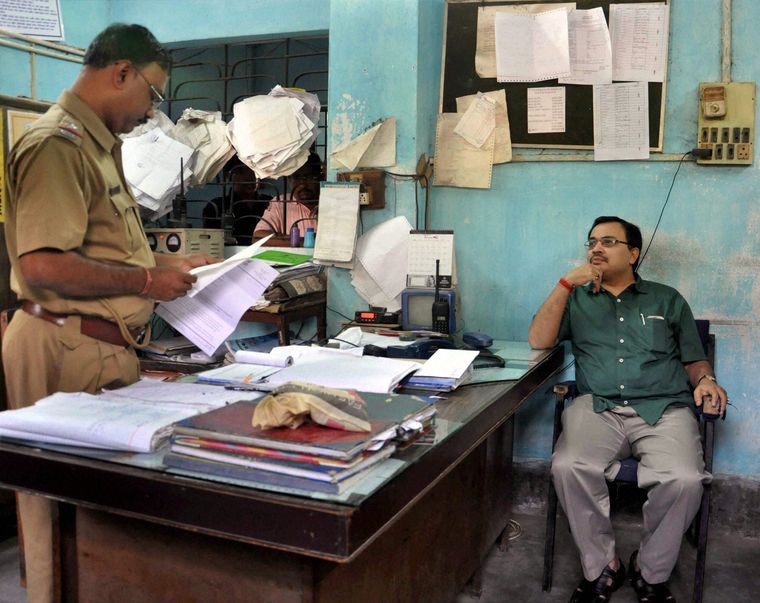ON FEBRUARY 5, while directing Kolkata Police Commissioner Rajeev Kumar to appear before the CBI at a neutral venue, Chief Justice of India Ranjan Gogoi quipped, “Go to Shillong. It is a cool place.”
Gogoi’s order ensured that Kumar spent several days fielding queries from the CBI team investigating the Saradha chit fund scam. The irony was unmissable. The commissioner, who had earlier refused to meet CBI officers at his official bungalow in Kolkata, ended up shuttling from a cottage outside Shillong to the CBI office at Oakland.
Kumar, who had led the Kolkata Police’s special investigation team (SIT) that probed the Saradha scam, is accused of destroying evidence in the case. His interrogation was gruelling. In the first four days, he spent more than 40 hours responding to a 22-page questionnaire that had around 200 queries.
Kumar’s legal adviser, Biswajit Deb, said the commissioner was not an accused. “He was questioned on some vital issues as a witness,” he said. The CBI, however, insists that Kumar is an accused.
Kumar went to Shillong with Deb and two subordinates on February 8. A special aircraft flew him straight to the hill station from Kolkata. He checked into a cottage at Tripura Castle, a five-acre resort on the outskirts of Shillong, owned by the erstwhile royal family of Tripura. The CBI officers took a commercial flight to Guwahati, and then drove for three hours to reach Shillong.
The interrogation, which was scheduled to start at 10am on February 9, began an hour late because of extreme cold and the delay in making arrangements at the CBI office. Twelve CBI officers, including two from Kolkata, questioned Kumar for eight hours on the first day. He was asked about the case diaries which the police in Bidhannagar had allegedly doctored before handing them over to the CBI. Kumar was Bidhannagar commissioner when he was appointed head of the SIT probing the Saradha scam.
On February 10, six officers from Kolkata joined the CBI team. They asked Kumar about former Trinamool Congress MP Kunal Ghosh’s allegation that the SIT had destroyed evidence in the case. Kumar said he had no knowledge of any tampering.
The CBI said it had tried to contact Kumar several times to ascertain the genuineness of the evidence. Kumar allegedly refused to cooperate. Even after he became Kolkata Police commissioner in 2016, the CBI continued its efforts to question him. Asked why the CBI pursued Kumar, and not Gyanwant Singh, who succeeded him as Bidhannagar commissioner, a CBI officer replied, “The commissioner [Kumar] took all the evidence with him.”
The CBI says that crucial pieces of evidence in the Saradha case, such as computers and cellphones used by Saradha Group chairman Sudipta Sen, were not handed over to it. Also missing was a red diary which, according to Saradha Group director Debjani Chatterjee, had details of Sen’s illegal payouts to bureaucrats and ministers.
Kumar initially did not object to the prolonged questioning by the CBI. But, after two days, he made it clear that it would not be possible for him to stay in Shillong indefinitely, as he had to oversee the deployment of security forces for the school board exams in West Bengal on February 12. The CBI officers assured him that they would not drag out the sessions, but told him that they would like him to sit with Kunal Ghosh to cross-check certain details.
Ghosh, who was head of the Saradha Group’s media unit, was one of the first to be arrested by the SIT. After the CBI took over the case in 2014, Ghosh sent a 91-page letter to the agency, accusing the police of destroying evidence and detailing Saradha Group’s alleged links with the ruling Trinamool Congress.
Interestingly, Ghosh sent out a video message two days before he left Kolkata for Shillong to attend the joint questioning session with Kumar. “I was a loyal member of the Trinamool Congress, and would remain so despite all the troubles I have faced,” he said. “I can’t change the boat now.”
Ghosh was arrested in November 2013. After he got bail in October 2016, he has been manoeuvring to get back into the good books of Chief Minister Mamata Banerjee, whom he had described in the letter to the CBI as the “sole beneficiary” of the Saradha scam. Interestingly, despite his allegations against Mamata, he has remained a Trinamool member, and is still seen at party gatherings in Kolkata.
According to Ghosh, after he got bail, the Union government offered to make him an adviser in the telecommunication department. “I refused to accept that because I would not be able to switch loyalties,” he said. “Despite the torture I faced in the party, Mamata Banerjee remains my leader.”
Ghosh’s renewed support to Mamata—his recent video message, especially—has perturbed the CBI, which had been using his 2014 letter to build its case against those involved in the scam. The agency appears unfazed, though. “Recorded and written statements are, and will be, valid till the completion of trial,” said a CBI officer. “Also, no one pressured him to write the letter. He wrote it on his own.”
Ghosh’s flip-flops have put the focus on a gaping hole in the investigation: There is no magisterial confessional statement by him under section 164 of the Code of Criminal Procedure, which carries more weight than any statement recorded by the police under section 161 of the CrPC. “Magisterial confession under section 164 is regarded as prime evidence by the court,” said Arindam Das, senior advocate at the Calcutta High Court. “The accused cannot backtrack on his statement during trial.”
As per law, when an accused shows his desire to give a statement to the magistrate under section 164, he should be sent to a segregated cell under judicial custody for 48 hours. This is to help the accused make up his mind without external interference.
THE WEEK accessed documents that revealed that Ghosh’s plea for giving a confessional statement under section 164 was accepted by a Bidhannagar court on November 29, 2013. He was sent to a segregated cell in Dum Dum Jail for 48 hours. “The next day, the jail superintendent came to me and asked me to break the segregation,” Ghosh told the CBI later.
He said the police did not want him to appear before the magistrate. “I was told that if I withdrew [my plea for giving] the section 164 statement, I would not be charged with a fresh case and that my relatives would be spared from harassment,” he said. Under pressure, Ghosh did not give the statement, and was later shifted to Howrah Jail.
On April 7, 2014, he again tried to give the statement. “But no police officer interrogated me or recorded my statement,” he told the CBI. “The police said that the order from above was to just keep me in custody and not interrogate.”
Apparently, it was the reason behind Ghosh’s decision to write to the CBI in 2014. But then, it begs a question: Why did the CBI, too, choose not to record his section 164 statement? A CBI officer defended the decision saying Ghosh had given written statements to the CBI, which the agency has submitted to the court in the form of a supplementary charge-sheet.
But experts say the CBI, too, was under pressure not to record the confession. “The CBI is equally responsible for not having recorded the section 164 statement,” said Arunava Ghosh, senior lawyer at the Calcutta High Court. “It shows that the agency was also under the pressure from its political masters. There was a clear understanding between Mamata and [Prime Minister Narendra] Modi on this.”
The way the Kolkata Police commissioner dealt with Ghosh’s allegations also lends credence to this claim. Sources said Ghosh, during the joint questioning session with Kumar, accused the commissioner of taking “orders from above” to sabotage the police investigation. But Kumar was largely evasive during questioning, which is one reason why the CBI denied his request to return to Kolkata after the third day of questioning.
According to the CBI, Kumar admitted that the SIT under him did not actually carry out the inquiry, and that the investigation was done at the “police-station level”. Apparently, the day-to-day investigation was carried out on Kumar’s behalf by Arnab Ghosh, who was deputy commissioner of Bidhannagar and is now superintendent of police of North Dinajpur.
Interestingly, during the interrogation, Kumar read out from the CBI investigation manual to argue whether the investigators had the mandate to ask certain questions to him. “He evaded most questions,” said a CBI officer. “He even raised doubts about the legitimacy of many queries.”
Interestingly, it was the Congress’s state unit, and not the BJP, that had filed the petition on which the Supreme Court directed the CBI to take over the case. With the CBI struggling to obtain a clinching evidence in the case, state Congress leaders now allege that both the Union and state governments are working in tandem to scuttle the investigation.
“The Modi government and the Mamata government have jointly destroyed the investigation,” said Somen Mitra, state Congress president. “The CBI had for long been dragging out the investigation. Now it is simply making a show of it.”




